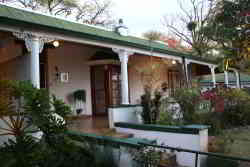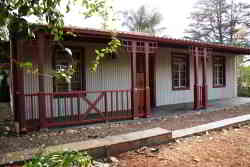There are few sellers in South Africa who sell in order to emigrate, according to the FNB survey on Emigration and Semi-Gration related selling.

Located on Heritage Walk, this home is currently used as a guesthouse and is priced at R1.74 million. It includes a three bedroom (all en suite) house with Oregon pine floors, windows and doors, sunny patio and lush garden, as well as two self-catering cottages.
The FNB Estate Agent survey for the third quarter revealed that emigration related selling of residential property is 4 percent of total selling.
In 2008, selling homes in order to relocate to another part of South Africa was 13 percent of total residential selling.
Later that year, with the onset of the recession the number fell to 6 percent.
The mild economic recovery of 2009/10 brought about a slight rise in relocation selling to 8 percent last summer and this has since dropped back to 7 percent in the latest two surveys.
FNB Home Loans property strategist John Loos says a number of people in smaller provinces tend to move to areas such as Gauteng and the Western Cape thus adding to the number of sellers moving within the country.
He says because of the weaker economy, some people prefer to stay put in their current employment and location which explains why there are less sellers wanting to emigrate or move to other provinces.
Current homeowners may not be selling to emigrate or move elsewhere in the country as they used to, but some buyers have discovered a pot of gold in property investments in Mpumalanga.
Pam Golding Properties (PGP) reports that buyers from Gauteng and Cape Town are mostly relocating to the town of Barberton thanks to the attractive character of the town’s homes.
Gerhard van Niekerk, PGP area principal says many home buyers are relocating to the area and they like older, character homes.
“Acquiring such a home is, I believe, a sentimental decision due to a desire to be part of a bygone era,” he says.
Barberton’s character homes usually have Brookie Lace on the wraparound verandas, Oregon pine floors, windows and doors, and some have steel pressed ceilings.
The houses date back from the early gold digging era featuring corrugated iron structures, he says.

Todd House, a National Heritage Site in Barberton was recently sold by Pam Golding Properties for R880 000. This beauty was built by Samuel Todd who established commercial farming in the Barberton District, having seen the opportunity to supply fruit and vegetables to the diggers on the goldfields.
Van Niekerk explains that the tranquil and appealing town of Barberton has an interesting history going back to the days of the gold rush in the 1880s, and while the discoveries of gold on the Witwatersrand in 1886 then focused attention further afield, mining in the Barberton area continues today.
The Sheba Mine, founded in 1883, is said to be the oldest constantly producing gold mine in the world and still yields gold today along with a few other local mines.
Barberton is also known for its archaeological significance as the Komati River valley, home to Archaean lavas known as Komatiites, said to be the oldest volcanic rocks and formed at temperatures of approximately 1650 degrees centigrade.
He says PGP recently sold Todd House, a National Heritage Site for R880 000. This beauty was built by Samuel Todd who established commercial farming in the Barberton District, having seen the opportunity to supply fruit and vegetables to the diggers on the goldfields.
During the Anglo Boer War Todd House was used by the British as the officers’ club and the original fence surrounding the property remains today.
Modern two bedroom apartments and six bedroom homes are priced at R3 million.
Character homes range from R960 000 for a two bedroom one bathroom home with dining room, formal sitting room, wraparound veranda and self-catering cottage to R1.74 million for a four bedroom, four bathroom (three en suite), wraparound veranda, formal dining room and lounge with two self-catering cottages.
Several homes which require varying levels of refurbishment are priced from R995 000 to just over R1 million.
Barberton used to be a significant tobacco producing and cattle farming area. During 2003/4 the tobacco supply exceeded demand and many tobacco farmers struggled to make ends meet.
Since 1996 government became a serious buyer of farms in the district, acquiring some 14 000 hectares at a total investment of approximately R171 million, with the majority of farms purchased in 2007 when 6 900 hectares were acquired for R108 million.
Some of these farms were bought for restitution purposes (where farms were subject to land claims) and others in terms of land reform (where there were no land claims), he says.
Farms for sale include macadamia and game farms, cattle and irrigation farms. A 989 hectare game farm is on the market for t R15 million, a 10 percent share in a 984 hectare game farm share block for R1.6 million - depending on usage rights, a 208 hectare irrigation farm sells for R6.5 million and a 21 hectare leisure farm at a reduced price of R2.4 million.
Buy-to-let investors are reportedly cashing in on rentals because Barberton has a strong demand for rental properties.

Priced at R1.08 million this home has three bedrooms, two bathrooms, Oregon floors, wooden deck and an established garden.
He explains that an average house with three bedrooms can achieve rental income of up to R6 000 per month and good homes priced between R1 million and R1.3 million achieve rentals of between R7 000 and R8 000 per month.
Because of rental stock shortages, tenants continue to renew their leases and investors have no worries about income.
He says in 2006 average house prices in Barberton were R359 88, R479 447 in 2007 and R540 928 in 2008.
In line with the national market trends this reduced to R504 383 in 2009, and went up to R557 864 in 2010.
“Currently the average house price in this area is R789 300 for freehold property and R575 370 for sectional title schemes – all of which demonstrates a sound increase in property values from an investment perspective.”
He adds that there is a lot of demand for family homes in Barberton priced between R700 000 to R850 000.
This amount buys a three bedroom, two bathroom property with dining room/lounge, TV room and invariably an undercover patio or veranda.
Homes priced from R900 000 usually have a swimming pool as well. – Denise Mhlanga
Readers' Comments Have a comment about this article? Email us now.









